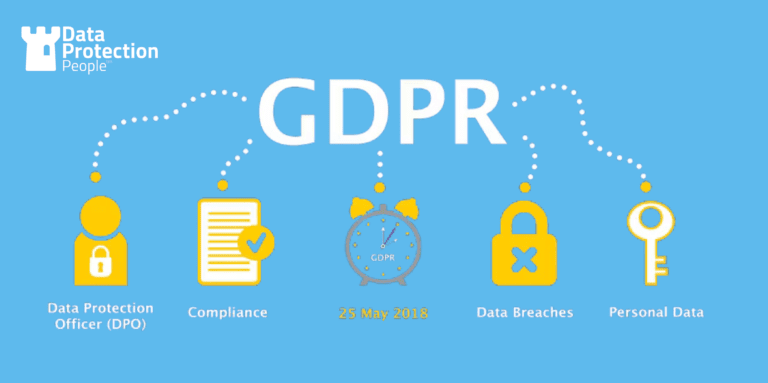GDPR Explained
Understanding The GDPR
The General Data Protection Regulation (GDPR) is a pivotal EU law designed to protect individuals’ personal data, giving them greater control over how their information is handled. Since its enforcement in May 2018, organisations worldwide must comply with its requirements or face significant penalties.

GDPR Explained: A Comprehensive Guide
At Data Protection People, we have been at the forefront of GDPR compliance since the regulation came into effect. With years of hands-on experience, we have supported organisations across various industries in navigating the complexities of data protection. Below, we’ll break down the key aspects of the GDPR and explore what the future holds for data privacy.
What is the GDPR?
The General Data Protection Regulation (GDPR) is a landmark piece of legislation introduced by the European Union to regulate the handling of personal data. Its primary goal is to ensure that individuals have control over their personal data, requiring organisations to adopt strict data protection measures and transparency practices. The General Data Protection Regulation is a crucial framework for safeguarding privacy rights in an era of increasing digitalisation, where data breaches and misuse of personal information are real risks.
Why is the GDPR Important?
Data has become one of the most valuable assets for businesses worldwide. However, with this value comes the responsibility to handle it ethically and securely. The GDPR not only places obligations on businesses to protect personal data but also provides individuals with enhanced rights to access, rectify, and even delete their data.
For any organisation dealing with EU residents’ personal data, GDPR compliance is not just a legal requirement—it’s a business imperative. Failing to comply can lead to severe financial penalties and reputational damage. In fact, fines can reach up to €20 million or 4% of an organisation’s global turnover, whichever is higher.
What Does GDPR Stand For?
GDPR stands for General Data Protection Regulation. It is the core of the EU’s digital privacy framework, established to unify and strengthen data protection laws across all EU member states. Its influence, however, extends far beyond the EU borders, impacting global businesses that interact with or process the data of EU residents.
Who Needs to Comply with the GDPR?
One of the defining aspects of the General Data Protection Regulation is its extraterritorial reach. It applies to any organisation—whether based within the EU or outside it—that processes the personal data of EU citizens or residents. This includes a wide array of entities:
- Businesses: All commercial enterprises that offer goods or services to EU residents or monitor their behaviour must comply with the General Data Protection Regulation.
- Government agencies: Public bodies that handle personal data are also bound by the GDPR’s provisions.
- Non-profits: Charitable organisations that process personal data are not exempt from compliance.
In essence, if your organisation touches any form of personal data belonging to an EU citizen, GDPR compliance is a necessity, no matter where your company operates.
When Did the GDPR Come into Action?
The General Data Protection Regulation was formally adopted on April 27, 2016, but its enforcement began on May 25, 2018. This gave businesses a two-year transitional period to ensure compliance with its requirements. As the regulation became enforceable, many organisations faced the challenge of rapidly implementing new policies and procedures to meet the GDPR’s stringent demands.
At Data Protection People, we were there from day one, helping businesses large and small to interpret, implement, and comply with this transformative legislation.
What Does the Future of the GDPR Look Like?
The GDPR is often described as a “living” regulation, meaning it is not a static set of rules but one that adapts to the evolving digital landscape. Over the years, we have seen technological advancements such as artificial intelligence, blockchain, and the Internet of Things push the boundaries of data collection and processing. As these technologies continue to develop, we expect the General Data Protection Regulation to evolve as well.
Future updates to the regulation may focus on emerging challenges, such as the use of facial recognition, biometric data, and the increasing role of automation in decision-making processes. Furthermore, as other jurisdictions implement their own data protection laws, the General Data Protection Regulation could influence global standards in privacy and data security.
Data Protection People: Your GDPR Experts
Since the inception of the General Data Protection Regulation, Data Protection People has been the trusted partner for organisations striving to maintain compliance. We understand that GDPR is not a one-size-fits-all regulation, and that each organisation has unique data protection needs.
Our services include:
- Comprehensive GDPR Training: We provide in-depth training to help your team understand the requirements and best practices for maintaining GDPR compliance.
- GDPR Gap Assessments: Our experts will assess your current data protection practices, identify areas of non-compliance, and provide you with actionable recommendations.
- Tailored GDPR Compliance Plans: We’ll work with you to create a compliance roadmap tailored to your specific organisational needs.
- Ongoing Support and Audits: The data protection landscape is always changing. We provide continuous support to ensure you stay compliant, including regular audits to monitor adherence to GDPR requirements.
- Data Breach Response: If the worst happens, we are on hand to help you manage a data breach, mitigate damage, and report incidents in accordance with GDPR obligations.
We believe that GDPR compliance is more than a regulatory checkbox—it’s a fundamental aspect of building trust with your customers and ensuring sustainable growth in a data-driven world.
Contact Data Protection People
If your organisation is still grappling with GDPR compliance or looking to future-proof your data protection strategy, we are here to help. Reach out to us today to find out how we can support you on your GDPR journey.
We offer a compliance toolkit which can support you with your journey: check it out here.
